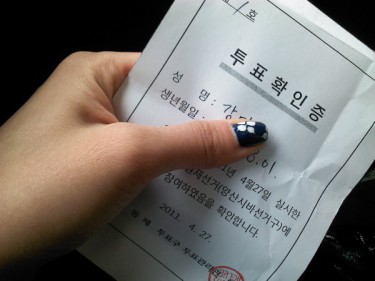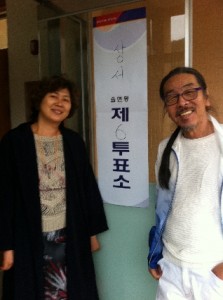South Korea's ruling Grand National Party suffered a crushing defeat in by-elections on April 27, demonstrating a widespread yearning for change, and to many also heralding the power of Twitter in the political landscape. Throughout the election, many young, progressive Twitter users uploaded so-called “vote confirmation photos” from the polls to prove they have cast a ballot, and encourage others to vote.
It was neither a presidential nor major parliamentary election, which means that young voters were not expected to make an impact. The average voting rates for by-elections are usually only about 30 percent, and in some regions even less. Young voters in their early 20s to late 30s usually vote least of all. But this year it was different.
A celebration of the right to vote
On April 27, starting from the early morning, young people queued at the polls braving the rain, while the Twittersphere buzzed with links to photos of people holding their official voter registration paper or voting receipt.
A photograph in front of a billboard telling the direction to the voting booth was another way of taking the photo. Other popular shots were to take a picture of the special national election voting stamp mark on thumbs or palms. Some overly enthusiastic people went a little too far, photographing the ballot inside the voting booth, which is illegal and carries a fine.
Power Tweeters in South Korea have played a tremendous role in encouraging young people to vote. South Korea's best-selling author and one of the country's most influential Twitter users, Lee Oi-soo with 739,469 followers, also shared his vote confirmation photo.
The Twitter voting campaign was not in support of any particular party or individual, but rather encouraged people, especially the youngest voters, to participate in the election. As a result, the election on April 27 experienced a higher than expected voter turnout of near 40 percent, a surge of approximately a 7 percent from the average since 2000.
One reason the voting rates for by-elections are usually extra low, is that people do not get the day off to vote. One local news report estimated [ko] that in order for an average office worker to cast a vote in a by-election, they have to get up at around 5:30 am in order to arrive at the poll by 6:30 am and get to work, which begins at 7 am.
Defeat for the ruling party
One candidate from the ruling conservative Grand National Party, suffered particular defeat in the election: Ohm Ki-young, a former news anchor president of network TV channel, MBC. Ohm has been harshly criticized for entering the conservative party, since many South Koreans remember his progressive opinions from his news program, and see the political shift as an opportunist move.
Sun Dae-in (@kennedian3), another power Tweeter with 37,500 followers, and assistant dean of the Kim Kwang-su Economic Research Institute, tweeted victoriously on the morning of April 28:
이번 선거에서 트위터 등 SNS의 위력을 다시 실감. 엄기영 후보의 부실한 실체는 SNS 타고 급속히 확산됐고, 높은 투표율도 트위터의 투표 독려 운동이 상당히 영향 미친 듯. 흩어진 물방울이 강물과 바다가 되게 하는 SNS
Sun commented further [ko] on Ohm's defeat:
최문순 지사 승리보다 엄기영 후보 패배가 매우 큰 의미 지닌다고 봅니다. 언론장악 시도에 맥없이 굴종한 기회주의자 심판, 불법부정선거에 대한 심판, 이미지 뒤에 숨은 부실한 실체 심판… 무엇보다 이를 SNS 주도로 해냈다는 점 말입니다.
Sun later added [ko] that more than 100 people have sent him their vote confirmation photo.
Lee Mi-ah (@miaendless) commented on Twitter [ko] that this by-election is a milestone case which showed an ever-widening gap between the traditional media and social media coverage.
신문과 티비뉴스 내용과 소셜미디어 유저들 사이에서 유통되는 콘텐츠의 시각차와 시차가 이처럼 극명하고도 빠르게 엇갈리는 선거판을 못봤다.주류언론에서 ‘엄숙한’ 분위기로 물타기에 축소가 난무하는 사이 소셜미디어에선 ‘투표소 인증샷'으로 세상이 바뀌었다.
This relatively new concept of a Twitter campaign has drawn serious warnings from the National Election Commission, which is not familiar with people's voluntary movements on Twitter.
Freelance journalist and the owner of a malguli (rice liquor) store, Lee Yo-yong (@yiyoyong) with nearly 5,000 Twitter followers tweeted [ko] that she was contacted by confused officials:
투표독려 이벤트 했다고, 무슨 의도냐고, 중앙선거관리위원회(선관위)에서 전화왔네요. 무슨 의도냐고. 특정 정당과 관계있냐고. 월향당은 도대체 뭐냐고[…]
Wol-hyang is the name of the liquor store owned by Lee, which helps to show the depth of the National Election Commission's confusion. In Korean Twittersphere, the word ‘party’ as in Democratic party or conservative party, has lost its political connotation and is being widely used to refer any gathering of like-minded people with similar interests. Many responded to Lee on Twitter, that this really shows that their social media guidelines are in need of an update [ko].










7 comments